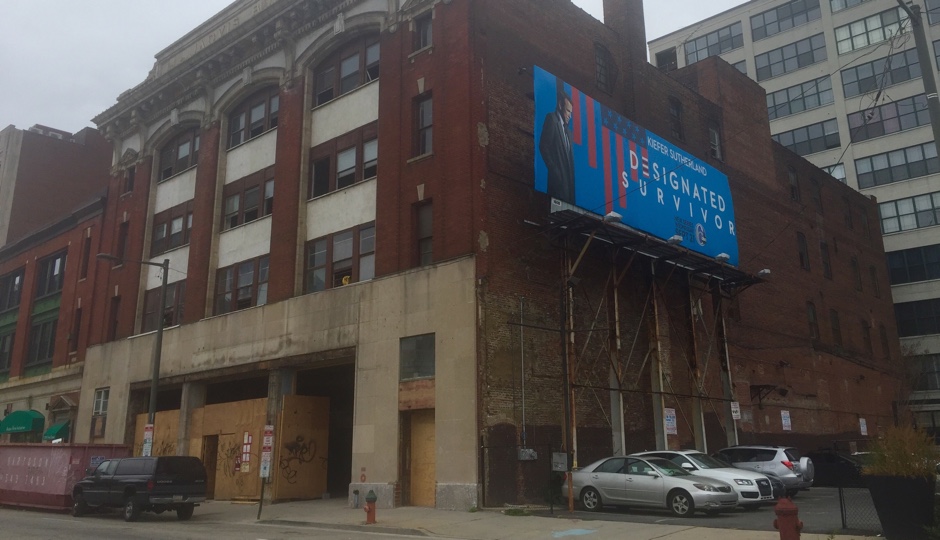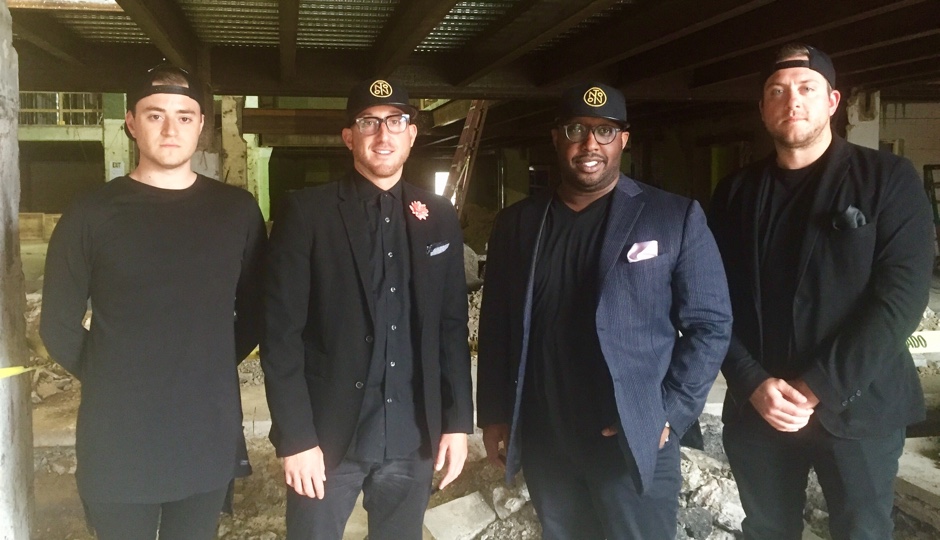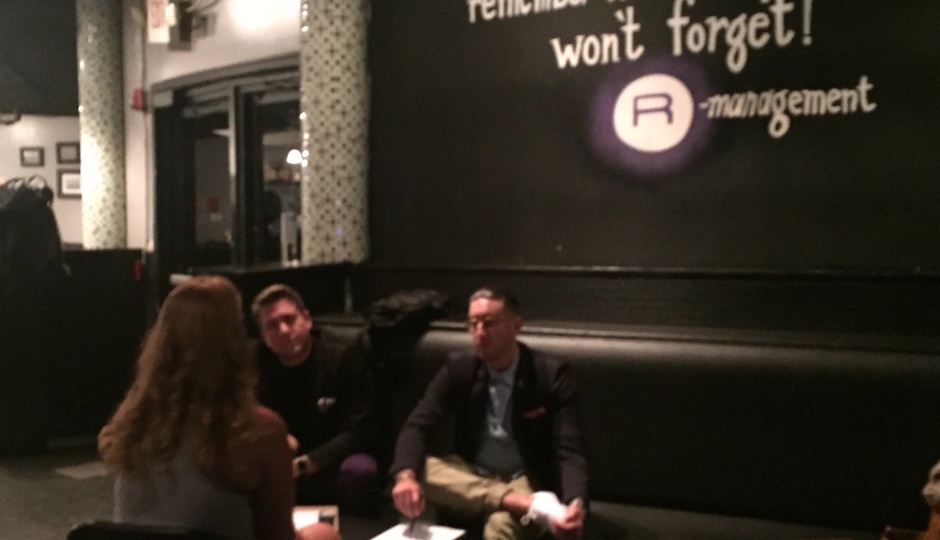Meet the Team That’s Building Philly’s Biggest Nightclub Ever

1209 Vine Street. Photo by Fabiola Cineas
Back in August, news broke that a 24-year-old out-of-town developer had plans to erect Philadelphia’s biggest nightclub.
In case you didn’t believe the project was real (like I didn’t), I visited the site of the 1,000-person venue, 1209 Vine Street, just last week. Yes, NOTO (short for “Not of the Ordinary”) is a thing, and yes it’s still happening.
With doors slated to open at the end of November, a lot about this development has come to light in the last few months.
Right now, the site is mostly dust and debris — the remains of Wakisha Charter School — but a stage at the front of the venue is visible through the haze and the club’s mezzanine level that is just steel bars now, is beginning to protrude above the ground floor’s 2,900 square-foot main room.
“Looking at this, I know it’s hard to believe it will be open next month,” James De Berardine, NOTO’s young director told me as we walked through the space. “But it will be,” he said.
By the time the structure is complete, it’s expected to house 24 bottle service tables, 27 restrooms, a VIP room and three bars ranging from 22 to 42 feet long. And in the lobby, guests will be greeted by a 7-foot-by-7-foot chandelier made of old perfume bottles salvaged from a hotel in London. The space will also have a 420-square-foot LED wall and an L’Acoustics sound system shipped in from the Netherlands.
And changes to the building aren’t the only areas taking shape with NOTO. De Berardine added four local nightclub gurus to his team — Ryan Dorsey, director; Zach Seidman, director of hospitality and marketing; Jeff Bowell, director of operations; and Steve Sauls, operations manager. Together the team holds a combined 53 years of experience working in nightclubs from Atlantic City to Vegas. And that’s including De Berardine’s zero years of experience.

The NOTO management team. Left to right: James De Berardine, Zach Seidman, Ryan Dorsey and Jeff Bowell. Photo by Fabiola Cineas
“I do have no experience,” De Berardine told me. “That’s why I made it a priority to find people in the marketplace who do have experience because I am not naïve enough to think that I can do it entirely by myself.”
In January 2016, the Meritus Group, De Berardine’s family-owned real estate company, acquired the 60,000 square-foot property for $6 million, following an eight-month search for a building in a commercial zoning district that would support a nightclub of this scale.
“The zoning was changed on the property just before acquisition, and that’s why we were able to pursue it,” De Berardine said. “There are so many overlays and rules throughout the city that prohibit nightclubs especially.”
So why did De Berardine choose Philadelphia?
He did his research on cities from Toronto to Miami and was drawn to Philadelphia’s promise to become “a real metropolitan area.”
“The city has [booming] tourism, all the historic elements, and I sincerely believe nightlife is an important component to any city,” DeBerardine said, with a nod to cities like Amsterdam and London that have government officials hired to promote the nightlife economy. A court in Berlin just ruled that techno is a high art, so the city’s legendary club, Berghain, will now be taxed at a lower rate.
De Berardine added: “Philadelphia has an evolving demographic which I think will support this concept. The city alone has 1.6 million residents, and the Center City neighborhood is the biggest downtown core neighborhood after Manhattan.”
The team sees a strong opportunity to attract Philadelphians and other partygoers in the region who now travel to Atlantic City for nightlife.
“We have so many millennials traveling right now to have fun. Anyone who lives in Philadelphia has to drive 55 minutes to Atlantic City or hop on a train to New York or get on a plane to Los Angeles,” said Dorsey, the NOTO director who’s been a managing partner of Recess Lounge for seven years and is an owner of Center City’s Dos Tacos.
The nighttime trek to Atlantic City is definitely something Philadelphians are familiar with: It’s a friend’s birthday or you have guests in town who expect to be wowed, so you opt for the boardwalk pilgrimage. In a mere four hours, you drop stacks on gas, dinner, entertainment and even a hotel room. And if you’re hungover the next morning, you put mobility on hold.
“We want our people in Philadelphia to not leave Philadelphia to get what they deserve. We want them to get an Uber or just walk to NOTO,” said Seidman, the club’s director of hospitality and marketing. He’s spent the past few years with the esteemed Hakkasan Group in Atlantic City’s HQ Beach Club and HQ Nightclub, both formerly part of the now defunct Revel casino. He was also The Fillmore’s nightlife director.
“We don’t want Philadelphians to get in a car and drive for miles to go to Atlantic City or New York because our city is just as cool,” Seidman added.
But can this ambitious project actually bring Philadelphians out from under the rock and summon those disillusioned by the nighttime scene?
It’s all about providing an experience for guests that they might not have previously realized they were entitled to, said Bowell, the director of operations. Bowell’s background is as extensive as Seidman’s and Dorsey’s. He’s spent nearly a decade with the Hakkasan Group as a bartender and lead mixologist in Vegas clubs like LAX Nightclub and the now-shuttered Noir Bar and Savile Row and has experience working under the STARR Catering Group.
Bowell says that what they want to provide is in the club’s name: a night that is “not of the ordinary” (NOTO, pronounced “no-toe”) for Philadelphians. This means setting the customer service bar very high. Though NOTO has no plans to stay open past 2 a.m., they’ll have to set the bar high enough to silence the naysayers who refuse to picture Philly as a nightlife town.
They’re hiring a VIP host team, a kind of small army that will cater to guests by calling them during the week to arrange their weekend accommodations — treatment common to Vegas nightclubs but largely absent in Philly, the team said.

NOTO held interviews at Recess Lounge.
After interviewing more than 450 people during a few open-call job fairs over the past few weeks, NOTO has hired about 70 percent of its staff, including guest ambassadors, barbacks, bartenders, bottle servers and security. People from as far as Scranton, the Valley Forge Casino and South Jersey have shown up.
“We know our vodka and champagne won’t taste different than our competitor’s, so we’re placing value on the experience our staff provides and not the bottles our guests can purchase,” Bowell said.
But at the same time, NOTO doesn’t want to be unrealistic.
“We do have 24-bottle service tables, but you won’t see us setting minimums so high that it’s not attainable,” Dorsey said. “We don’t want Philadelphians saying ‘Are these guys out of their minds?’ We understand that it’s Philadelphia, and we want our guests to come back.”
Unrealistic to the team is expecting customers to pay $80 or $90 on a regular night to get in, so they’re looking at a $20 to $30 cover that will adjust according to the scale of the act or DJ.
For bottle-service tables, they’re looking to charge a small percentage over Philadelphia’s standard $600-$1,000 range.
The team also wants to change the physical shape of clubbing in Philly. The city is stuck in the lounge age, they say, with spaces that are long and skinny or compartmentalized into an amalgam of small rooms.
At NOTO, the main room will be central to the space. All of the action will happen there (excluding the VIP room for 200), and this structure will allow guests to fully indulge.
The club hasn’t released a lineup of acts, but you can expect to the see the likes of Swedish DJs Axwell and Steve Angello or local talent like DJ Montone at NOTO. The club doesn’t want to be known as that place you go to for one type of music like EDM, but will bring open-format DJs and hip-hop acts, too.
“You won’t have the same thing playing three nights in a row,” DeBarardine said.
Between the Fillmore and Wells Fargo Center, there are artists who can even do a show before or after their event or just swing by for a good time, Dorsey said, recounting the many times celebrities visited Philadelphia and quickly left because of limited nighttime options.
In 2014, rapper Lil’ Wayne, after performing with Drake in Camden, tweeted: “Absolutely nothing to do in philly! Get me out of here!”
Absolutely nothing to do in philly! Get me out of here!
— Lil Wayne WEEZY F (@LilTunechi) August 23, 2014
While the project is focused on reimagining the Philly scene, we can’t ignore the kinds of ramifications it may have on the Chinatown and Callowhill communities.
When I talked to the Philadelphia Chinatown Development Corporation in August, the group was bewildered by the plans. A recent conversation I had with Sarah Yeung, the organization’s director of planning, revealed that the organization is still a bit tense about the project, but it’s been involved.
“We’ve been in talks with De Berardine since the proposal period and when they were trying to get their liquor license back in the spring.” Yeung said. Now PCDC is working with NOTO to finalize a “community benefits agreement” that will hold the establishment accountable to neighborhood standards.
“What they’re trying to bring here is not like anything we’ve seen before,” Yeung said, “and we came into the process with a lot of concern because a club of this size is bound to have an impact on local residents. We are going to be vigilant and the agreement is only the beginning.”
The stipulations of the agreement touch upon noise and crowd control and address the very hour the club needs to have trash removed from the surrounding blocks. The community organizations also managed to work in an escrow fund to further hold the business accountable if they don’t meet the regulations laid out.
The Callowhill Neighborhood Association has been in on the talks, too, and president Sarah McEneaney told me the Callowhill community has “very much appreciated James’ willingness to work […] on the agreement.”
William La Torre, former head of the Bureau of Liquor Compliance Enforcement for the state police, will also lead the staff on liquor compliance and security guidelines, and NOTO has also been working with Police Captain John J. Ryan of the 6th District to facilitate cooperation in the neighborhood.
“We are committed to working with the neighborhood because we don’t want to be disruptive,” said DeBerardine, who now lives in the neighborhood.

NOTO banner outside of job fair. Photo by Fabiola Cineas
In the coming weeks, the team plans to buckle down on its marketing strategy. It is already active on Instagram, Facebook and Twitter, and plans to secure staff for the club’s open positions.
A small goal of NOTO’s is to hit capacity on opening night.
“It’s always been a dream for us to do this in the city that we were born in and that we love,” said Seidman, speaking of the three team members native to the Philadelphia region. (DeBeradine is from Connecticut and is a graduate of Lafayette College in Easton, Pennsylvania.)
“I think with Philadelphia, it’s not that people didn’t want to do this. It’s that people haven’t been able to do it because of a lack of capital,” Bowell said.
Dorsey chimed in: “So thank God James came along.”
Follow @fabiolacineas on Twitter.


